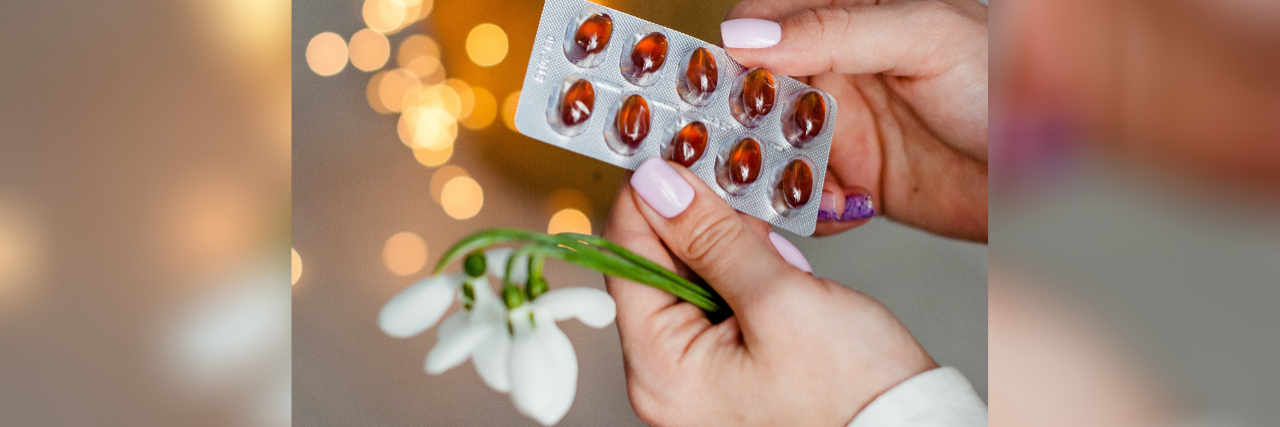Why I Have a Love-Hate Relationship With Psychiatric Medication
Editor's Note
Please see a doctor before starting or stopping a medication.
I’m a big believer in mental illness as a physical illness. Mental illness occurs in the brain, making its symptoms appear psychological. Symptoms are reflected in our behavior. But the brain is physical, so there really shouldn’t be a distinction where mental health is concerned. Mental health is physical health.
It has taken me years to sort out which behaviors are the “real” me and which are bipolar disorder symptoms. When I’m in the throes of an episode, I can’t tell the difference. That’s when I’m learning to put my trust in my doctors and certain carefully chosen friends and family members whom I can trust to let me know if they think I’m having trouble with bipolar again.
I rely on medications, as well. My first response to a budding manic or depressive episode is a call to my psychiatrist’s office to make an appointment. I am very fortunate to have found a psychiatric nurse practitioner who trusts me and whom I trust. She and I can discuss whatever is happening and we determine together whether a medication change is in order.
I have a background in pharmacy. I was a pharmacist before bipolar wrecked my life. (I didn’t get diagnosed until age 42.) Even with my education and experience, I have trouble keeping up with my meds. I don’t miss doses but that’s because I’m vigilant. I take several psychiatric meds and several unrelated prescriptions. For various reasons, all of the meds run out at different times of the month, and insurance won’t let me refill anything too early.
I tried using one of those pill organizers but it threw me off. It was tricky to know when I needed to order refills. Additionally, when you take a lot of meds, it can be difficult to identify them once they’re out of their original prescription bottle. I have pills I take on waking up, pills I take before dinner, and another round of pills I take at bedtime. Some of those pills are to be taken twice a day. Some need to be taken with food, some on an empty stomach. For me it’s better to keep everything in its original bottle.
If I, as a former health care professional and as someone who knows what she takes and why, need so much time and organization to keep my meds straight, I can only imagine how difficult it must be for someone who doesn’t know what each medication is for or when to take it. If there’s an out-of-stock situation at the pharmacy, or if there is an insurance snag, or a delay in mail order, you can run out of important meds. Getting everything worked out can take multiple phone calls to doctors and the pharmacy. This is even worse for those of us who battle anxiety. The entire process can be daunting. It’s tempting, when the world seems to not want me to get a refill, to just say “forget it.” It’s not worth the trouble.
Ah, but it is worth the trouble. I know what happens when I don’t take my meds, and it seems like each episode is more difficult to recover from than the last.
Psychiatric medications require a lot of patience. It took months of fine-tuning after my last episode but I’m very happy with the medication cocktail I’m on now. I have also made lifestyle changes, with special attention to diet, exercise and sleep hygiene. But I credit the medications with keeping me stable for the past couple of years. It’s a challenge to keep up with refills and insurance, but I know that without my meds there would be another episode in my future, and another, and another. I always have episodes left. I’m not sure I have many more recoveries left.
If your meds are causing side effects, talk to your doctor. (Never quit your meds without talking to your provider.) Don’t give up on the idea of medications altogether just because you’ve had a bad experience with one or two or many. Keep at it. If you need help keeping up with your medications, enlist the help of a trusted family member if possible. There are a few apps that can help you organize your medications and keep track of whether you’ve taken a dose. Medisafe is free for iPhone and Android. Learn what each of your meds does and talk to your doctor if you’re unsure why they have prescribed something. These measures will increase compliance, which will result in fewer episodes and a more stable life. Isn’t that what we all want?
Photo by Kate Hliznitsova on Unsplash

